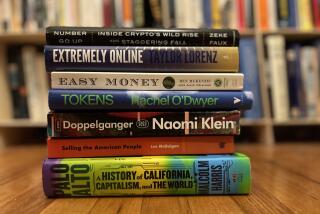DISCOVERIES
- Share via
Some of us simply weren’t ready to digest the first round of books explaining what the World Wide Web was and how it would change our lives. We were too busy learning how to use e-mail to read manifestos such as Nicholas Negroponte’s “Being Digital” (1995), Raymond Kurzweil’s “The Age of Spiritual Machines” (1999) or Michael Heim’s “Virtual Realism” (1997), much less the Journal of the Hyperlinked Organization. I speak loosely for those whom the revolution swept over but who now find themselves comfortable enough with the mechanics to sit back and philosophize about the physical and social effects of the Internet. In “Small Pieces Loosely Joined,” David Weinberger guides us gracefully through the effects and history of that revolution, just in time to ready us for the next one. “The Web will have its deepest effect as an idea,” not as the tool it has become for most of us, Weinberger concludes. “Ideas don’t explode; they subvert.”
“Suppose--just suppose--that the Web is a new world that we’re just beginning to inhabit,” he writes. “We’re like the early European settlers in the United States, living on the edge of the forest.” He begins gently with suppositions like this, raising issues, one by one, picking up speed, drawing us further and further from concepts we are comfortable with, until, midway through “Small Pieces,” we look down to find our understanding of the Internet--as a tool--far beneath our feet. It can actually make you dizzy to consider the changes that have already occurred in the ways in which we express ourselves.
These changes raise questions of morality and judgment over what is good art-bad art. No one wants to sound like Jesse Helms, but these are important questions that one should think about. Weinberger’s answer to the good art-bad art question is that there is a trade-off involved. We’ll have to put up with “awful information,” “but in return we’ll get a vibrant new world, accessible to everyone.... The design assumption of the Internet was that it’s an imperfect world.” With so much information available, certainty becomes less, not more possible, rendering strong opinions about good and bad less supportable. The Web is not slick; it is not about the perfection of the advertising Hallmark-card world.
Is the Web making us more or less social? Weinberger believes wholeheartedly that it provides more possibilities for meaningful, person-to-person connection as well as for group conversation without the impediments of gender, color or class distinctions that are found in real life. He seems to think that role-playing on the Web is harmless and that the public focuses way too much on the anomalies, the exceptions who use the Web for dangerous or perverse purposes. “So many things don’t make sense on the Web that we’re suffering from anomaly fatigue.... The real problem we face with the Web is not understanding the anomalies but facing how deeply weird the ordinary is.”
The Web has changed our perception of space because it puts “everything we need within equally distanceless reach,” eliminating, for example, the way marketing and advertising gets between us and the information or products we need. The desires of the consumer trump corporate greed. “The politics of the Web,” he writes, “by its very nature, is that of public rights and public ownership.”
The same goes for time. “You are in control of your time on the Web.” That hasn’t been true for as long as man has inhabited the planet. “Web time is threaded.” And here is where the idea of small pieces loosely joined comes in. “Web threads run in two directions. Some, like the ones in chat rooms and e-mail, bind messages together across a stretch of time. Others--hyperlinks--stitch together Web places.”
Why has our mental reality always been so different from our bodily reality? The Web joins the two in revolutionary ways. By eliminating issues of time and space, we interact more responsively to our world. We may be less able to control, even manage, that world, but it is closer to real or natural experience than the old world. “The Web is profoundly unmanaged, and that is crucial to its success. It takes traditional command and control structures and busts them up into many small pieces that loosely join themselves.”
In the end, the Web may help us cut through the use of morality and values to control behavior; the monarchy of authority over creativity; the exploitation of the world rather than a responsive interdependent harmony within it. For the brief and shining hours that I held this book in my hands, I believed that all this was possible. I saw the Emerald City shimmering in the distance.
More to Read
Sign up for our Book Club newsletter
Get the latest news, events and more from the Los Angeles Times Book Club, and help us get L.A. reading and talking.
You may occasionally receive promotional content from the Los Angeles Times.








